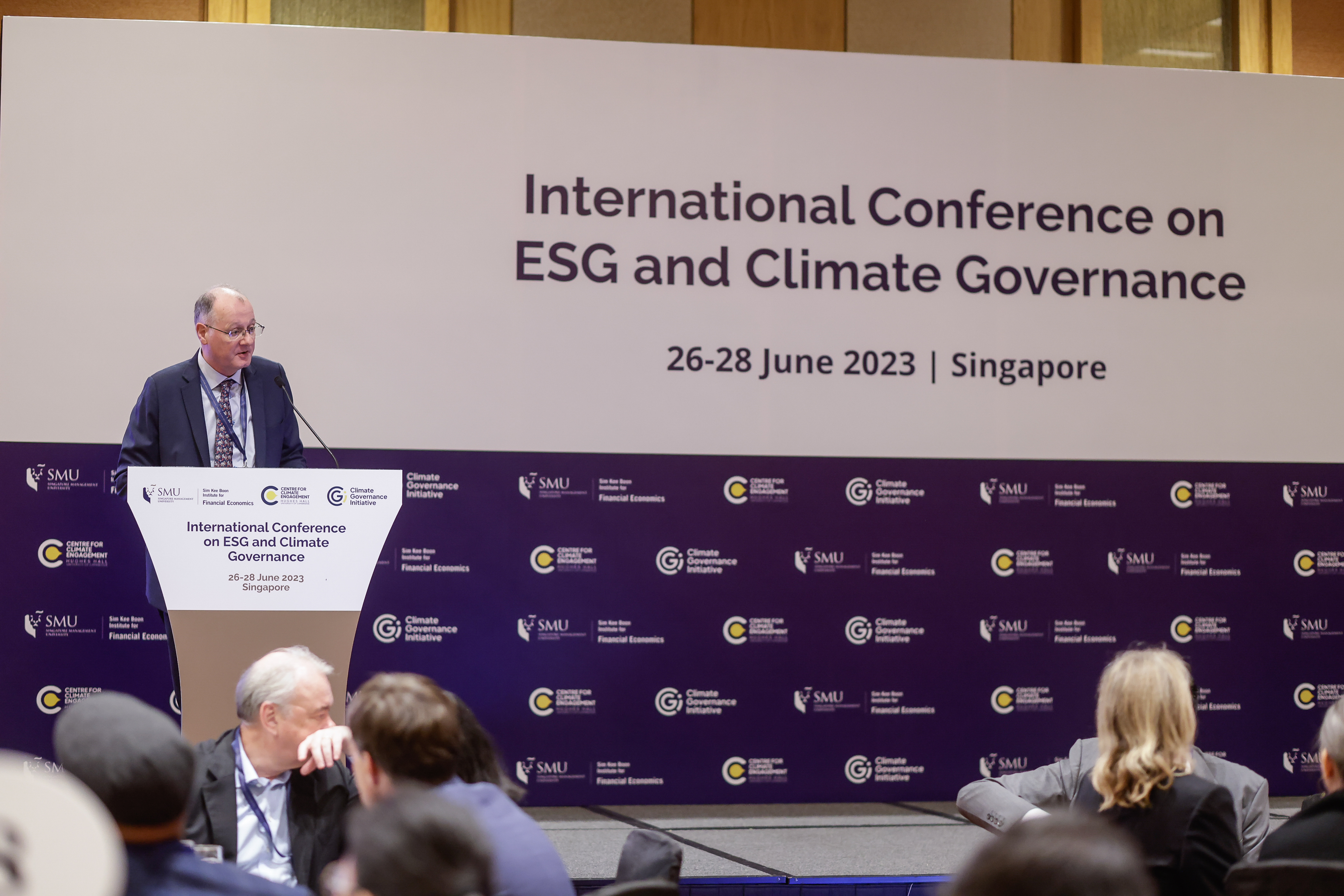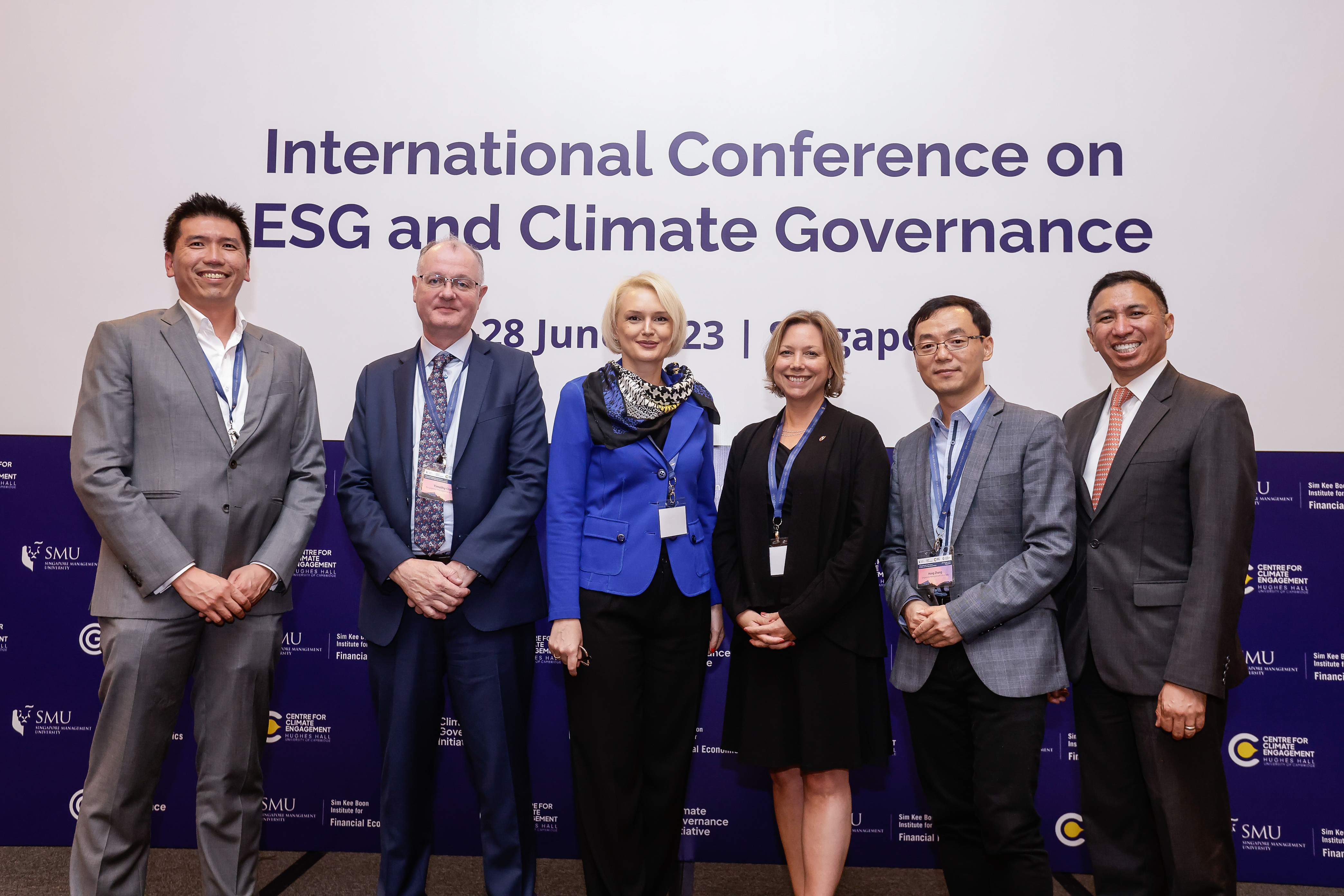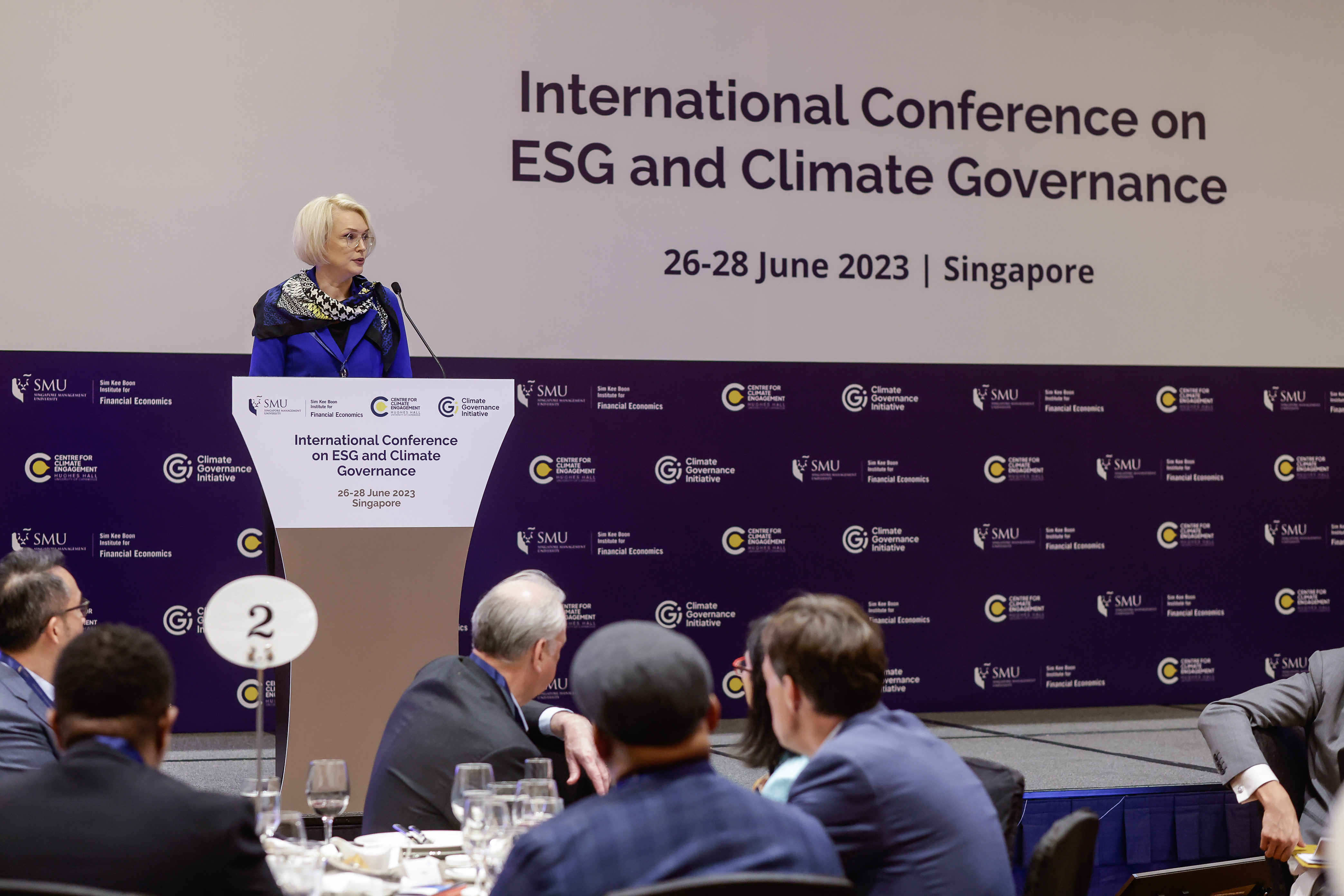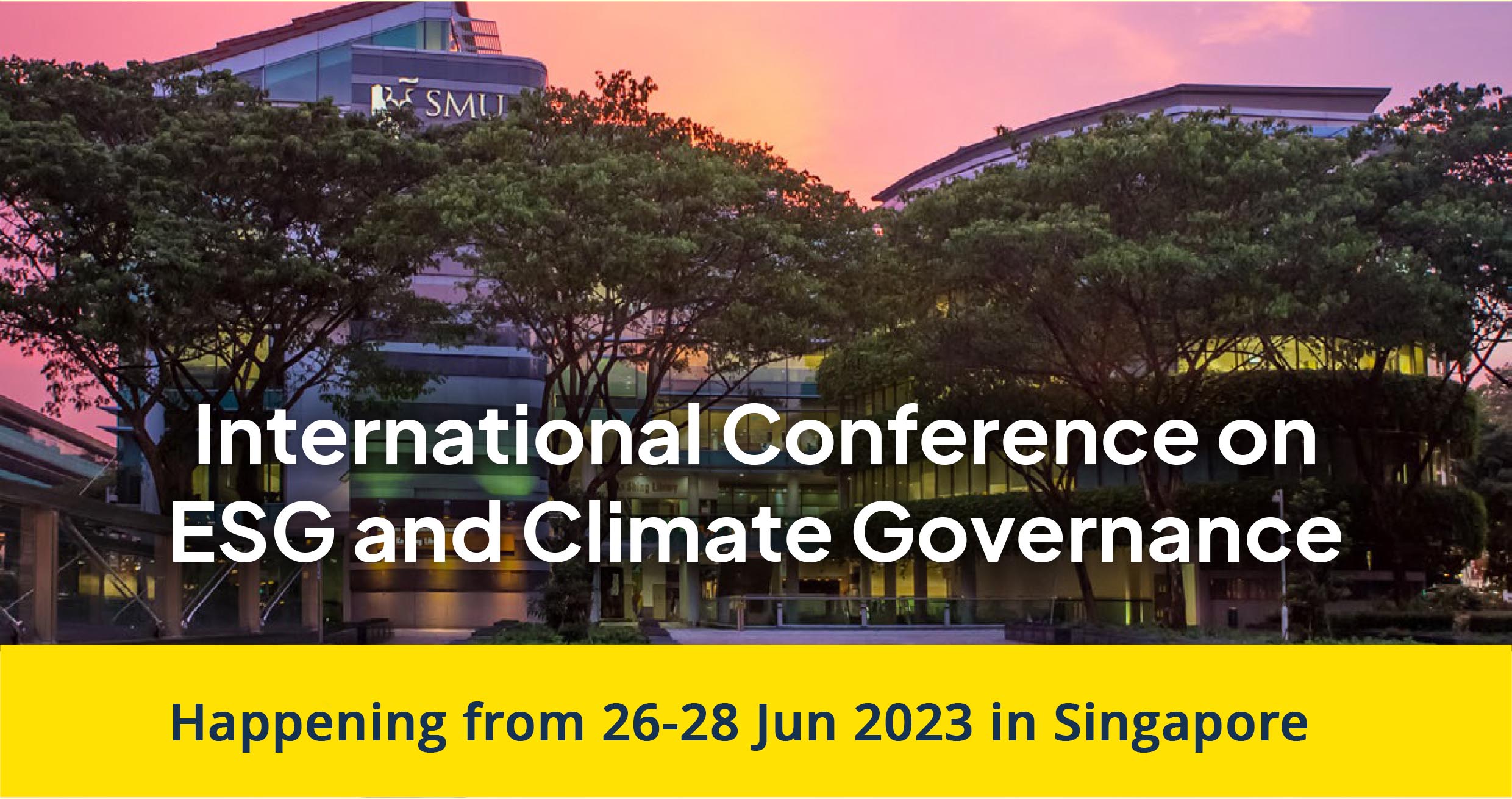
Timothy Clark, Provost of Singapore Management University, giving the welcome address at the International Conference on ESG and Climate Governance, held at Marina Bay Sands from 26-28 June 2023.
1. Welcome
Guest-of-Honour, Her Excellency Kateryna Zelenko, Ukrainian Ambassador to Singapore
Director of the Centre for Climate Engagement at Hughes Hall, University of Cambridge, Emily Farnworth
Distinguished guests
Good Evening
It is my great pleasure to welcome you to the Inaugural conference on ESG and climate governance.
2.1 About the collaboration and the Conference
This conference is a global collaboration between:
- the Centre for Climate Engagement and Climate Governance Initiative, based at Hughes Hall, University of Cambridge,
- and, Singapore Management University (SMU)’s Sim Kee Boon Institute for Financial Economics, with support from the Singapore Green Finance Centre (SGFC).
Addressing climate issues requires strong collaboration between academia and industry and within these across disciplines and sectors. But forums facilitating such interactions are rare. It therefore is wonderful to note that the conference offers a unique opportunity whereby academic experts, practitioners, and board directors from six continents, across disciplines and industry sectors gather here, at MBS to address theoretical and practical challenges to climate action across the world, by drawing on academic expertise to develop impactful solutions which can be put to practice. At SMU we prioritise the translation of academic knowledge to address real-world issue.
2.2 About SKBI
Hosting this conference in Singapore is the Sim Kee Boon Institute for Financial Economics or SKBI for short. The institute sits within the Lee Kong Chian School of Business in Singapore Management University. It was established in 2008, so this year marks SKBI’s 15th Anniversary.
The institute was named after Mr Sim Kee Boon, a leading member of the founding generation of civil servants who, together with Singapore’s leaders, steered the nation through a period of turbulence and uncertainty to the success and stability Singapore enjoys today.
In his honour, the work that SKBI undertakes embodies the values Mr Sim stood for – SKBI is driven to help address the pressing needs of industry and society, using the best ideas available to improve society through high quality research, thought leadership and convene events to bring relevant communities together to focus on specific issues of salience.
You can read more about the remarkable like of Mr Sim in this biography, co-published by the institute last year. You should have received a copy of the book at the registration desk.
3.1 SKBI’s work on sustainability and climate change
When Professor Dave Fernandez first came onboard as SKBI’s director in 2018, he asked two questions.
- “What areas of economics and finance are most important to society today?”
- And, “What areas of economics & finance are today out of mainstream academic research?”
The answers to these two questions have formed the research pillars on which the institute currently focuses– one of which is Sustainability and Sustainable Finance.
This leads us to where we are today - Professor Fernandez’s idea of holding a global academic conference in Singapore to forward the corporate climate governance agenda.
3.2 SMU/SKBI as knowledge partner of CGS (CGI Singapore chapter)
Besides co-organising this global conference, the Sim Kee Boon Institute is also involved in championing the corporate climate governance work within Singapore. It is the knowledge partner of Climate Governance Singapore, the local chapter of the World Economic Forum’s Climate Governance Initiative.
As knowledge partner, SKBI has curated a knowledge hub, featuring:
- a curated library of research and pedagogic materials,
- in-person events,
- and, online training series to build a strong stakeholder network to better address the challenges of climate change.
As a side event to this main conference, Climate Governance Singapore will host a webinar on 28th June, at 3:30pm which will distil insights and share key takeaways from this conference to a wider audience.
3.3 SGFC’s work in sustainability
SKBI’s work in sustainability does not stop there.
In 2020, the institute answered the call from the Monetary Authority of Singapore to set up the Singapore Green Finance Centre, together with our partner, Imperial College Business School.
The centre conducts multi-disciplinary research and training to help develop strategies for policy makers and financial institutions to support Asia’s transition to a low carbon future. One outcome of this initiative is an asynchronous online course on “Climate Change Management”, taught by SMU Associate Professor of Urban Climate, Winston Chow.
Professor Chow researches and teaches on climate change impacts on cities, and was a lead author for the Intergovernmental Panel on Climate Change (IPCC)'s 6th Assessment Report on Impacts, Adaptation and Vulnerability on urban climate issues. He is also a member of the IPCC’s Task Group on Data Support for Climate Change Assessments.
4.1 Keynote speaker, SMU Prof Winston Chow
You will hear more from him later tonight as he will be giving the keynote address on the IPCC report.
4.2 Opening speaker Mr Loh Boon Chye’s involvement in the SKBI/SGFC board
Tomorrow, you will hear from CEO of the Singapore Stock Exchange, Mr LOH Boon Chye, on the state of ESG in Singapore. Mr Loh sits on the advisory board of both SKBI as its Chair.
4.3 Other SKBI Visiting Faculty & Staff involved
A number of the Sim Kee Boon Institute’s Visiting faculty will also be participating in this 3-day conference as speakers. They include Cintia Külzer Sacilotto & Christoph Nedopil.
Rajiv Lall, Sim Kee Boon Institute’s Professorial Research Fellow, and SKBI’s director, Professor Dave Fernandez will also be speaking and moderating panels.
5. Conclusion
In closing, I would like to thank the teams from the Sim Kee Boon Institute, the Centre for Climate Engagement and Climate Governance Initiative, who have been working tirelessly to bring together academics and industry experts from across the world to make this conference a reality.
It is very exciting to be a part of this inaugural conference, and I look forward to the conference outputs which I am sure will set the stage for further progress in how board directors tackle climate change issues.
And with that, I wish all of you an enjoyable and productive time during the conference. I very much hope it will lead to new insights, discussions and connections that will impact significantly on the Climate Governance space globally.
Thank you and have a wonderful evening.
About the International Conference on ESG and Climate Governance
The inaugural International Conference on ESG and Climate Governance brings together academic experts, practitioners, and board directors from six continents, across disciplines and industry sectors to address theoretical and practical challenges to climate action across the world by drawing on academic expertise to develop impactful solutions which can be put to practice. Read the conference press release here.
About Timothy Clark
Prior to becoming Provost of SMU, Timothy Clark was Pro-Vice-Chancellor (Social Sciences and Health) at Durham University, United Kingdom, where he was also Executive Lead for Computer and Information Services (CIS) and Estates and Buildings. Professor Clark is a past Chair (2009) and President (2011) of the British Academy of Management and a Fellow of the Academy of Social Sciences and the British Academy of Management. Professor Clark was an Editor/General Editor of Journal of Management Studies (2000-2010). His research focuses on understanding the role and nature of management consultants and management gurus in the diffusion of management knowledge. In recent years, he has conducted a series of research projects into different aspects of the management consultancy industry, including the factors underpinning the selection and purchase of consultancy and the management of the client-consultant relationship.


